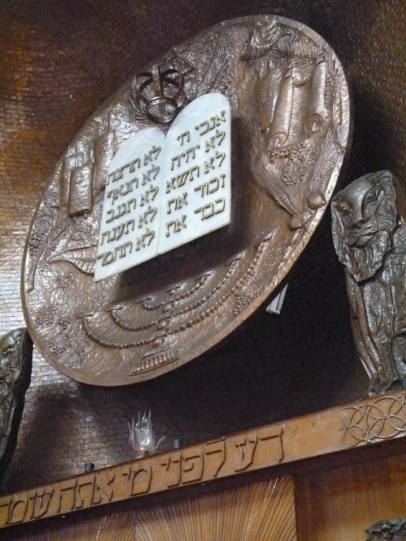De todas las sinagogas de Argentina, la gran mayoría están en Buenos Aires, la capital, que refleja en parte, el hecho de que hasta 80% de los judíos del país viven dentro o cerca de Buenos Aires. La Seminario Rabínico “Marshall Meyer Z”L” queda allí tanto como las sedes culturales la Asociación Mutual Israelita Argentina y La Hebraica y también el Congreso Judío-Latinoamericano. Y hay redes de escuelas judías y programas deportivas.
La situación en el interior del país es bien diferente. En las otras ciudades grandes, Córdoba, Rosario y Tucumán, el número de judíos no pueden soportar más de dos o tres sinagogas. En otros lugares, los socios luchan para mantenerse en comunidades o kehilot mucho más chicas. Estas sinagogas existen desde el calor de la provincias del Chaco y Resistencia hasta el frío de Tierra del Fuego en el sur. Son ortodoxos or masorati olam (Conservadores). Recientemente, Jabad Lubavitch, la organización ultra-ortodoxa, ha extendido sus servicios religiosos y sociales a lugares que antes tenía poca vida judía.
En las provincias de Entre Ríos y Santa Fe quedan sinagogas chicas fundadas a fines del siglo XIX en las colonias agrícolas en la pampa. Ahora unas pocas de estas sinagogas son activas; las otras han vuelto a ser museos de la época de “los gauchos judíos”, los primeros pioneros judíos en la Argentina.
_________________________________________________________
Of all the synagogues in Argentina, the vast majority are in Buenos Aires, the capital, which reflects in part the fact that up to 80% of the country’s Jews live in or near Buenos Aires. “Marshall Meyer Z”L” Rabbinical Seminary is there as well as the cultural headquarters of the Argentine Israelite Mutual Association and La Hebraica and also the Jewish-Latin American Congress. And there are networks of Jewish schools and sports programs.
The situation in the interior of the country is quite different. In the other large cities, Córdoba, Rosario and Tucumán, the number of Jews cannot support more than two or three synagogues. In other places, members struggle to stay in much smaller communities or kehilá. These synagogues exist from the heat of the provinces of Chaco and Resistencia to the cold of Tierra del Fuego in the south. They are orthodox or masorati olam (Conservatives). Recently, Chabad Lubavitch, the ultra-Orthodox organization, has extended its religious and social services to places that previously had little Jewish life.
In the provinces of Entre Ríos and Santa Fe there are still small synagogues founded at the end of the 19th century in the agricultural colonies on the pampas. Now a few of these synagogues are active; the others have returned to being museums from the time of “the Jewish gauchos”, the first Jewish pioneers in Argentina.
_________________________________________________________________
Sinagogas ubicadas fuera de Buenos Aires en el interior de la Argentina/Synagogues located outside of Buenos Aires in the interior of Argentina
________________________________________________________________









Vea también/See also: Moisés Ville, Colonia agricultora judía en la provincia de Santa Fe, Argentina/ Moisés Ville, a Jewish Agricultural Colony in Santa Fe Province, Argentina
__________________________________________________________







QUISIERA SABER CUAL SERIA EL TOTAL DE SINAGOGAS JUDÍAS QUE EXISTEN EN EL PAÍS?
Hay aeso de 90 sinagogas , 35 fuera sde Buenoe uenos
Hay a eso deb 90 sinagogas en Argentina con 36fuera de la capital.